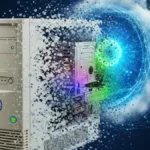A quick blast of electricity to one region of the brain can make a person better at math for up to six months, say neuroscientists at Oxford University.

But passing the current in the other direction reduced people’s ability to that of a six-year-old child.
The research builds on earlier work showing that temporary dyscalculia – an impairment in the processing of math problems – can be induced using brain stimulation, and could offer hope for treating the condition.
In the new study, 15 student volunteers were taught symbols that represented different numerical values, and then tested to see how quickly and accurately they could complete a series of mathematical puzzles using them.
Volunteers were given either a placebo or a low electrical stimulus that ran from right to left, or vice versa, across the parietal lobe.Those who received stimulation from the right to the left became very good at the tasks after a few sessions, whereas those with stimulation from the left to the right parietal lobes performed like six-year-olds. The placebo group’s results fell somewhere between the two.
The right-to-left group was re-tested six months after having been trained, and was found to have maintained a high level of performance.
“At the moment, our work is still experimental, so we are definitely not saying that people should use such techniques to treat children with learning difficulties or anyone else,” says Oxford’s Dr Cohen Kadosh.
“Much more research is needed before we can even start thinking of this kind of electrical stimulation as a treatment. However, we are extremely excited by the potential of our findings and are now looking into the underlying brain changes.”






